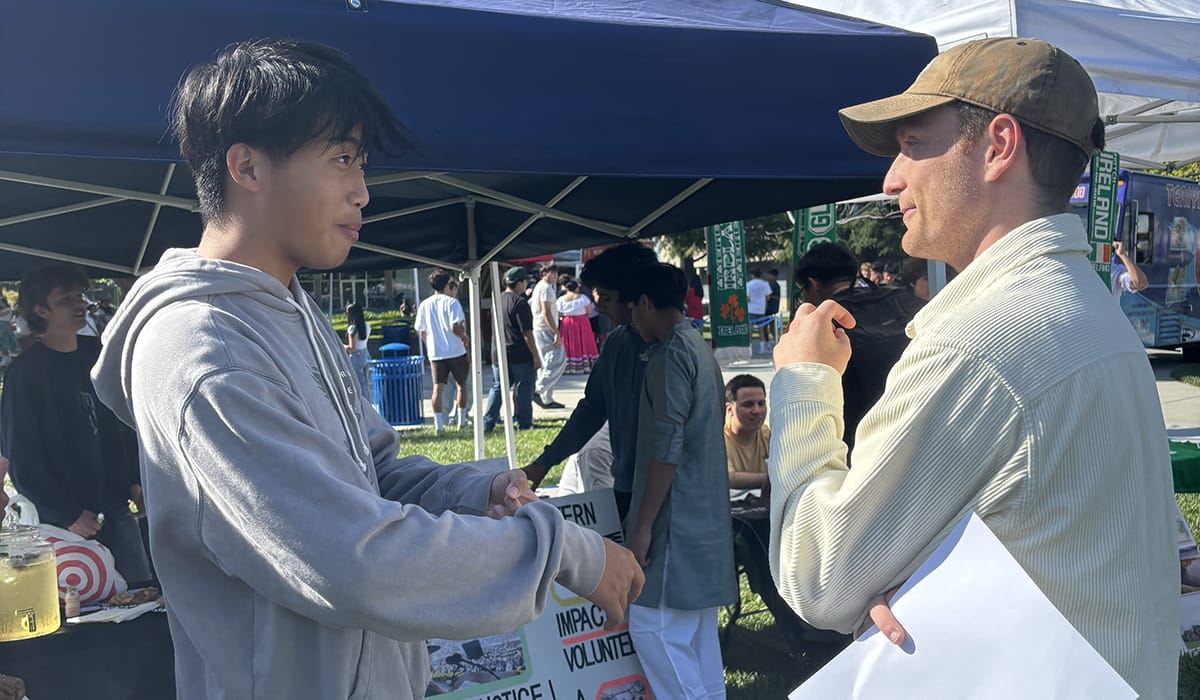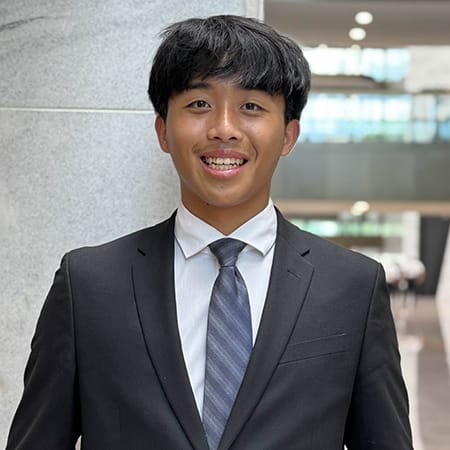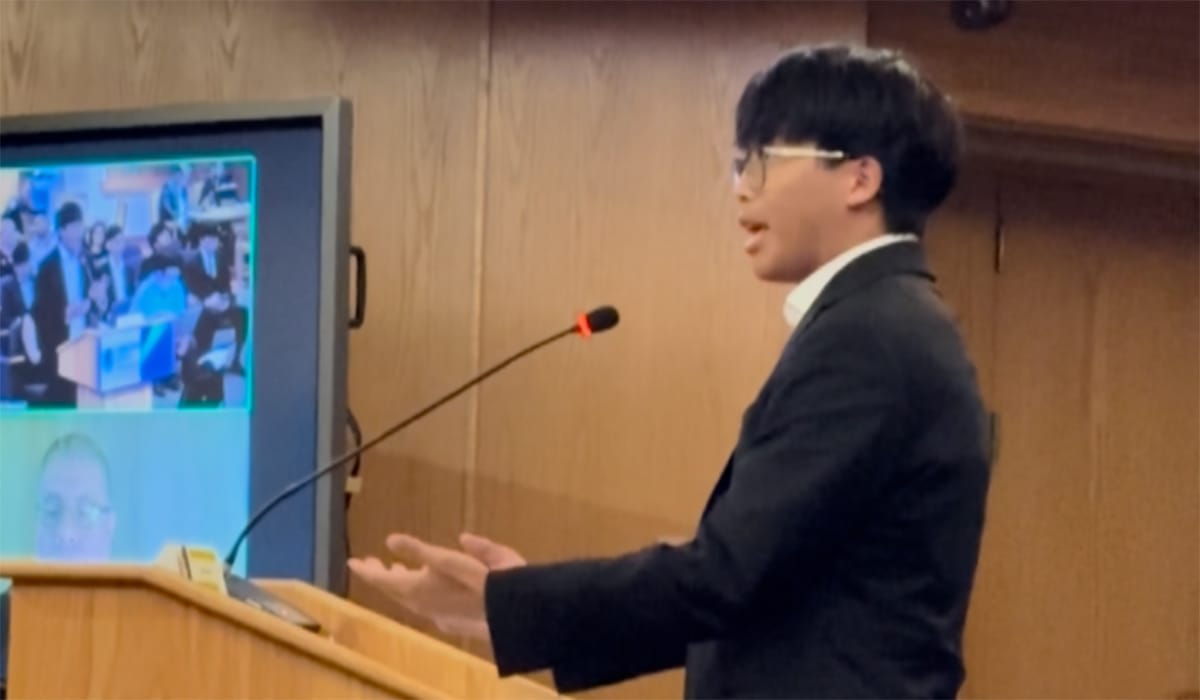Teen Ally Mobilizes Youth to Champion Indigenous Recognition

Meet Daily Point of Light Award honoree Aaron He. Read his story, and nominate an outstanding volunteer or family as a Daily Point of Light.
At just 17 years old, Aaron He is building a national movement to support Indigenous rights—specifically, the Muwekma Ohlone Tribe’s fight for federal recognition. As founder and president of the Indigenous Justice Coalition, Aaron leads more than 85 student interns and 22 chapters across the country, working alongside youth to become allies and advocates.
Through grant writing, political outreach and education, the Los Gatos, California, teen has helped raise over $510,000 in environmental and land funding for the tribe and mobilized support from more than 100 elected officials. Though not Indigenous himself, Aaron sees it as a moral obligation to speak up and he’s showing others how small steps can grow into real impact.
What inspired you to start the Indigenous Justice Coalition, and what does the organization do?
I first learned about the Muwekma Ohlone Tribe through policy debate in high school. We cover a lot of different social issues, and this one really stuck with me. I ended up interning for the tribe’s chairwoman during her congressional campaign.
When the campaign ended, we shifted our focus to political outreach. At the same time, a lot of students I talked to expressed interest in helping. That’s how the Indigenous Justice Coalition was born in 2023.
Now, we have multiple teams working on different aspects of advocacy—political outreach, grant writing, education and more. We’ve reached out to over 100 local, state and federal elected officials to ask for their support. We’ve helped secure over $510,000 in environmental and land grants for the Muwekma Ohlone Tribe. We’ve also launched 22 student chapters in seven states and organized dozens of events—from school assemblies to city council testimonies.

What are the main challenges the Muwekma Ohlone Tribe faces, and why is federal recognition so important?
The Muwekma Ohlone Tribe is not federally recognized, and that has major consequences. They’re denied benefits like free tuition at University of California schools, economic aid, repatriation of their ancestors from burial sites and cultural protections like access to the National Eagle Repository, where you’re able to get eagle feathers that are really important to their culture. During COVID, for example, $31 billion in federal relief went to recognized tribes, but the Muwekma Ohlone didn’t get any of it.
It’s a huge injustice that all stems from a clerical error in 1927. The Bureau of Indian Affairs actually acknowledged that the tribe was mistakenly removed from the list of recognized tribes.
You’re not Indigenous yourself. Why do you believe it’s important to support this work?
My parents immigrated from China, and I was born here, so I’m not Indigenous. I’m Chinese American. But I believe we all have a responsibility to support communities that are being marginalized. The Muwekma Ohlone Tribe needs allies, especially youth allies, to show decision-makers that there’s broad public support for their recognition. If it’s only the tribe advocating, it can look self-interested. But when others stand with them, it sends a stronger message.
Morally, I think that once you know about injustice, choosing to ignore it is still a decision. That’s the same kind of indifference that’s allowed their erasure to continue for over a century.
How did you grow the organization from an idea to something with national reach?
It started with a few friends who agreed to help with political outreach. Then I talked to more classmates, attended school volunteer fairs and got the word out. As we built out initiatives—like grant applications and speaking events—people saw it was a real organization, not just a club. From there, we reached out to students at other schools and formed chapters across the Bay Area and then in other states.
We now have over 85 student interns, and they’ve really embraced the mission. Some, like Caleb, who started as a regular intern, got so invested that he became our vice president.
What are some of your proudest accomplishments so far?
The $500,000 grant is a big one. It came from our finance team’s amazing work applying for environmental and land grants. We’ve also made political progress. This June, we organized a week-long advocacy trip to Washington, D.C., and met with congressional offices.
What would it take for the tribe to receive federal recognition?
There are three main paths. One is through the Bureau of Indian Affairs, which re-recognize the tribe. The second is through Congress passing a bill. The third is through the courts—if a judge determines the tribe has sovereign immunity, the BIA would be required to recognize them.
Our outreach is mostly focused on Congress right now, which is why we’re organizing more trips to D.C. and gathering local support from city councils.
How do you get students to care about an issue they may not feel personally connected to?
That was a challenge at first. Some students thought, “I’m not Indigenous, so this doesn’t involve me.” But we host in-person volunteer events where students can meet tribal members and hear their stories. That personal connection changes everything. Once they see the humanity behind the issue, the divide kind of disappears.
We also show them how this work can help them grow, whether they’re interested in politics, grant writing or research. There’s something for everyone to contribute, and I think students find a sense of purpose in that.
What are your long-term goals for the coalition?
We want to keep expanding our chapters so more students can get involved, especially in areas with other unrecognized tribes. Our Southern California chapter, for example, is now working with the Fernandeño Tataviam Band of Mission Indians. We want to do more of that—equip youth to support tribes in their own communities.
Of course, the ultimate goal is federal recognition for the Muwekma Ohlone. That’s a long-term battle, but we’re committed to it.

What has been the most rewarding part of this experience?
Hearing directly from tribal members that our work matters. The chairwoman always thanks us when we see her. That kind of gratitude, combined with seeing real impact, like the grants and political support, makes it all worth it.
What advice do you have for other young people who want to get involved?
Start small. My first step was canvassing. That led to something much bigger. Even if you face doubts or resistance, keep going. The cause is bigger than any one person, and change takes time. But it starts with one action.
What do you hope people take away from your story?
That you don’t have to be directly affected by an issue to care about it or act on it. Advocacy can be tough. I’ve faced pushback from friends, politicians, even people who questioned why I was involved. But if you believe in the cause, you push through. Small steps can lead to real impact.
Do you want to make a difference in your community like Aaron? Find local volunteer opportunities.